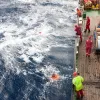Posted:
Scientists and technicians from the National Oceanography Centre are spending six weeks at sea gathering data from the deep ocean that provide important information about our varying climate. This year they will for the first time be retrieving data on the transport of carbon dioxide by the ocean.…
Posted:
For more than a decade scientists from the National Oceanography Centre in Southampton have been travelling to the subtropical Atlantic to collect data that provide important information about our changing climate. Just 15 miles from the sandy shores and coral reefs of the Bahamas the ocean floor…
Posted:
A new study led by the National Oceanography Centre (NOC) reveals that that dust generated by land erosion has large repercussions for oceanic processes and planetary climate. Wind-driven Saharan dust to the remote Atlantic Ocean not only provides phytoplankton with essential nutrients to promote…
Posted:
Scientists at the NOC have discovered 34 new species of giant single-celled organisms living at depths of more than 4 km in the eastern equatorial Pacific. The study areas are among those licensed by the International Seabed Authority (ISA) for exploration by companies with an interest in possible…
Posted:
NOC scientists contributed to a recent review of studies of submarine canyons, which identified they are at risk from human activities, and require better protection. The review was published in the journal Frontiers in Marine Science by a team of scientists that are part of the International…
Posted:
A project has ‘kicked-off’ in London that will create artificial storms to help predict worst-case scenarios for coastal flooding. Using computer models to make real storms more extreme, this National Oceanography Centre (NOC) led project will help inform the planning of coastal defences and…
Posted:
A new international study has demonstrated that deep-sea nodule mining will cause long-lasting damage to deep-sea life. This study, led by scientists at the National Oceanography Centre (NOC), was the first to review all the available information on the impacts of small-scale sea-floor…
Posted:
For one day of the year we open the doors of our Southampton office to the public, giving a unique view of the ground breaking science and engineering undertaken across the NOC. The day is a mix of hands on science, exhibits and talks, with content aimed at all age groups. This is a unique…







